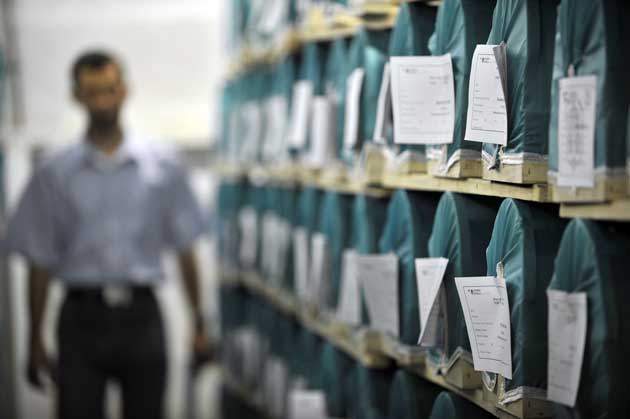Sharp fall in number of autopsies 'puts patients' lives at risk'

A dramatic reduction in the number of post-mortem examinations being carried out is endangering patients' lives and masking the number of errors made by doctors, leading medics have warned.
Autopsy numbers have fallen by up to 90 per cent in some areas in recent years, and that is making it harder to spot trends in disease development, misdiagnoses and evidence of substandard care.
Medical errors are picked up in nearly 40 per cent of post-mortem examinations, which offer a vital tool for improving patient care. Health officials then scrutinise death certificates to identify public health priorities.
But it is claimed that some doctors fail to appreciate how necessary autopsies are to patient safety, and regard obtaining permission from relatives as an unnecessary bind on their time.
There are two types of autopsy: those ordered by a coroner for sudden and suspicious deaths, and those in which doctors need consent from bereaved relatives for patients who die in hospital. The current crisis is in the latter group.
Consent autopsies were once carried out on 10 per cent of people who died in hospital. But The Independent on Sunday has discovered that in some areas less than 1 per cent of deaths now result in an autopsy.
"Natural" deaths are no longer studied to the extent they once were. Individual mistakes, hospital failings and emerging epidemics could be missed as a result, experts warn. This freefall in NHS autopsies has led to disillusionment among pathologists, and a growing number are opting out of such work.
Medical leaders are calling for urgent action and closer monitoring of coroner autopsies, which they believe are often second rate. "Consent post-mortem examinations are so infrequent it is almost irrelevant to talk about them," said Professor Peter Furness, vice-president of the Royal College of Pathologists and consultant histopathologist in Leicester. "It has huge implications and is a trend we would like to reverse ... The system is creaking and tension is building. We could end up with an insufficient number of pathologists with the necessary skills to undertake post-mortems."
But they remain the only way to identify accurately what went wrong in a patient. They are also the best way to monitor doctors and nurses to ensure treatment is up to scratch. And, experts say, they offer a unique opportunity for staff to learn from their mistakes.
Sebastian Lucas, professor of histopathology at King's College London and St Thomas' Hospital, said: "Pathology provides the best way to monitor and audit clinical practice. But we no longer have the critical mass of autopsies for quality control, and as a result we may not pick up something when it goes wrong. Autopsies should be seen as part of the whole care package. It would keep clinicians on their toes, pick up unknown complications and interactions, as well as problems that were missed before death, so that we can modify clinical practice and do better next time."
Accurate information about the cause of death plays a vital role in identifying emerging problems such as superbug epidemics or industrial diseases. This also drives government decisions about which diseases to tackle with limited NHS resources.
Professor Lucas said: "They play an important role in public health. Who's to say we didn't miss a trick with the obesity epidemic?"
The number of autopsies plummeted following the Bristol and Alder Hey organ-retention scandals. But research by the Royal College of Pathologists found the decline is largely due to doctors no longer asking relatives for permission.
Some doctors may not want to risk finding out they did something wrong or could have done better, according to Professor Furness. "The reason to request a post-mortem is to essentially find out if you got it right or not, so it may be easier for some doctors not to find out," he said.
Autopsies are no longer a mandatory part of medical training, so the majority of younger doctors have never seen one. Professor Lucas believes many doctors have no idea what they are missing and see it as an extra burden on their time.
Subscribe to Independent Premium to bookmark this article
Want to bookmark your favourite articles and stories to read or reference later? Start your Independent Premium subscription today.

Join our commenting forum
Join thought-provoking conversations, follow other Independent readers and see their replies